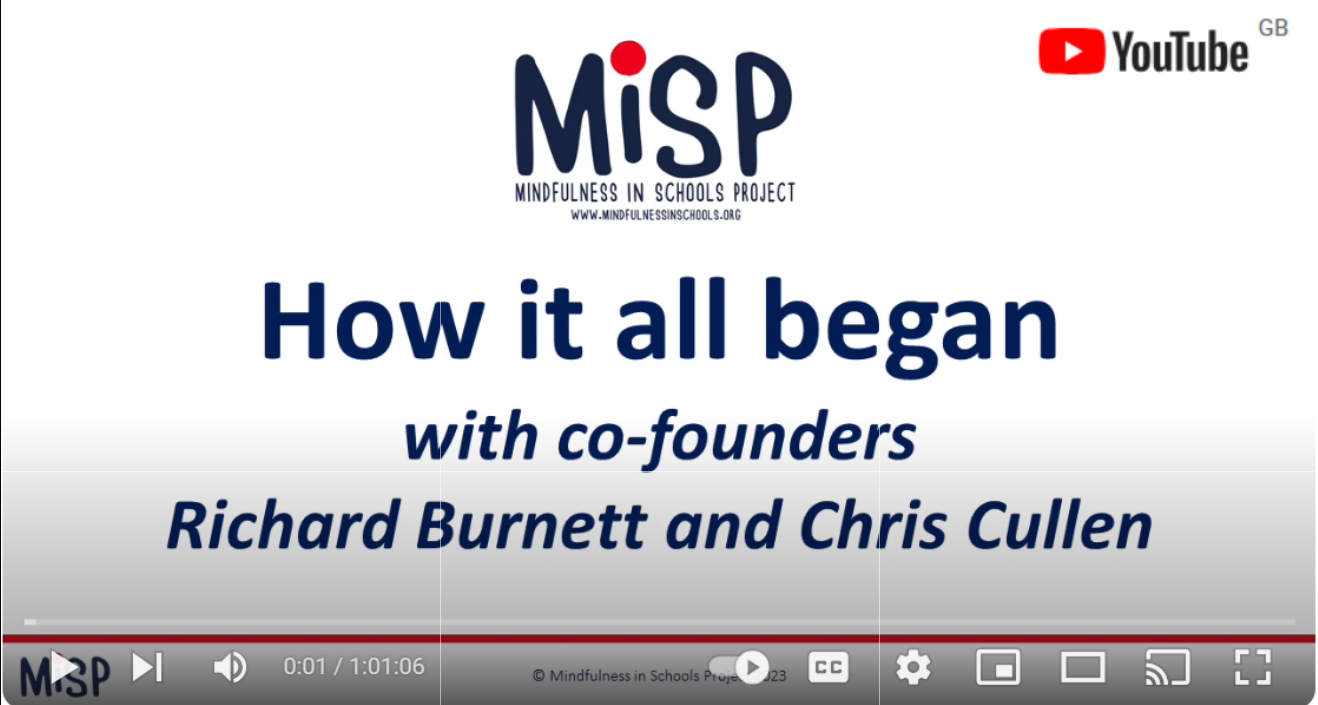On 20th September 2023, we held a webinar where Chris Cullen and Richard Burnett, MiSP’s co-founders, shared the early days of Mindfulness in Schools Project (MiSP) – what gave them the idea to set up MiSP, where their personal mindfulness journey started from and where has it taken them to this point…
You can watch the full recording by clicking the image above. If you are particularly interested in the MYRIAD research, we would suggest watching from 29:06 where Chris speaks to this specifically. Also, below is a transcript from this part of the session.
In brief, I think it’s really important to get clear about precisely what question the researchers were investigating?
It wasn’t the question – ‘is mindfulness beneficial for children and young people?’ Although the fact is that the outcome data that they got clearly suggests the answer is, yes, it is beneficial for children and young people – showing that the children who actually did mindfulness practices experienced clear benefits.
And what’s more the teachers benefitted from teaching it and from learning mindfulness themselves.
And… the school environment benefitted from the introduction of a school mindfulness programme.
But that wasn’t the question – if that had been the question, the answer would have been yes, for those who actually do it and engage with it.
But nor was the question ‘Can mindfulness be effectively taught in schools using the .b curriculum?’ Though again, looking carefully at the outcome data, the answer is ‘yes, mindfulness can be taught effectively using the .b curriculum’ and when it is well taught, again the children enjoy it and they practice it at home.
Those two questions, that weren’t asked and didn’t inform the design of the trial but if they were asked, the data show that mindfulness is beneficial and .b is an effective way of teaching it and of course, that’s in line with the previous research studies that had been done into .b.
If you look closely at the research design, the question was ‘Is mindfulness in schools scalable as a universal intervention?’
And the particular model that the researchers chose was to take 650 teachers whose only qualification had to be that they had not done any personal mindfulness training recently nor had trained to teach mindfulness, they didn’t even need to show any interest in mindfulness…and let’s remember that the 100 schools were given incentives, as happens on these trials, to nominate a teacher to take part, who didn’t even have to be interested in mindfulness.
[The] Myriad team offered valiant efforts to ‘hothouse’ these teachers in 2 to 3 months to teach them mindfulness, to develop their personal practice, to train them to teach .b and then they were assessed on only their second time of teaching the curriculum.And I do not know about you Richard, but I am really glad my teaching was not assessed on the second time I delivered it within weeks of establishing a mindfulness practice myself. It’s not surprising that the Myriad team themselves said that only a few of the teachers could be rated as having taught the course well but the design of the trial meant that whether it was those few that were teaching it well or those that were graded incompetent, all of those results fed into the final outcome.
For me then, it’s not surprising they got the results they did for that big trial, particularly as it’s notoriously difficult to do big psychological research in schools. Some big international programmes for wellbeing in schools, score either no results or negligible results when tested in the realities of secondary schools and so viewed with the wisdom of hindsight one can see that there was a kind of inevitability with that, and Richard had the foresight to see that there were really serious concerns we had about the dosage levels. Now, we did feel and we were persuaded by the researchers… and it was that way round, the researchers persuaded us by saying, ‘look, previous research on .b is really promising and this is a hypothesis worth testing and you’re getting constant feedback from pupils and from teachers that they really enjoy this so this is just going to be a learning experience for us all’ was how it was presented to us ….and it has been (a learning experience).
I have personally had some concern and surprise by how some of the research team have spun these results, some but not all but I do think this needs to be set in the context of the larger trajectory of research of the benefits of mindfulness with children and young people. I really do commend the MiSP response to Myriad, also Richard [Burnett’s] piece, and [Professor] Katherine Weare’s [Mindfulness Initiative] piece. She wrote a really good piece for the Mindfulness Initiative that has to be read alongside any of the press releases or information coming from Myriad.
I really commend the steadiness and commitment of MiSP at this time and I think history will prove to show that you have made the right choice.
In response to Emily’s question about how best to respond to any negative comms:
- We’ve been through hype cycles with mindfulness in general. I think a steady commitment to doing what you’re doing as well as you can through all the ups and the downs, I think that has served the larger mindfulness community well, informed with the knowledge that if teachers introduce it to schools with enthusiasm and experience, you get a sense of how much the children benefit.
- A great ornithologist Audubon used to say ‘If the bird and the book disagree, trust the bird.’
- Whatever the Myriad research might say, as a teacher in school with the kids in front of you, you know some of the kids benefit from this enormously and let that keep your heart inspired to be doing this incredibly important work.
- The fact that MiSP is committed to introducing, developing and maturing mindfulness practitioners in this really important field is just the way to go. We need a body of competent mindfulness practitioners and those of us that are mindfulness teachers are always in training and it’s a lifetime’s journey and we teach from that.

Chris Cullen is a trainer for the Oxford Mindfulness Centre, teaching on the Master’s programme in Mindfulness-Based Cognitive Therapy at Oxford University. He has a psychotherapy practice in Oxford, and is also on the team at the University of Oxford Counselling Service.
Previously he taught in secondary schools, and, with Richard Burnett, co-founded the Mindfulness in Schools Project in 2007. Between 2013 and 2020, he ran the mindfulness teaching programme in the UK Parliament, and co-founded the Mindfulness Initiative.
